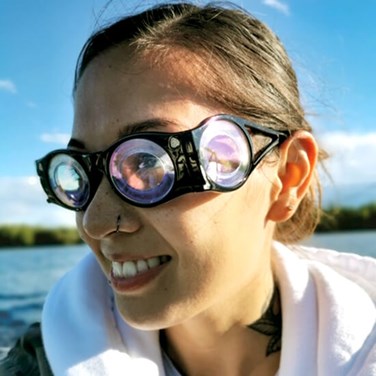Laurel Palmer is a Toronto-based Audiologist who also suffers from motion sickness. For Tech Reviews, she is testing out Boarding Glasses by Boarding Ring, on the road and at sea, to see if they can give her some relief.
Motion sickness. The inescapable wrench in travel plans that can extinguish any joy you hoped to get out of an adventure. But what if there was a simple solution? Say, a pair of glasses?
Motion sickness, or kinetosis, occurs when there is sensory conflict between our visual and vestibular systems [1]. This mismatch in sensory information may result in an array of symptoms ranging from general fatigue, to violent nausea and vomiting. Motion sickness affects nearly all individuals given the right circumstances, with about one in three people considered highly susceptible [2].

Laurel trying out the Boarding Glasses on the boat.
So, as someone who has lost innumerous days of fun to motion sickness, I was more than intrigued when I heard about Boarding Glasses by Boarding Ring (https://boardingglasses.com).
The company describes the Boarding Glasses as a medical device that cures motion sickness with 95% efficacy. The glasses have four lenses arranged in the frontal and sagittal directions around the eyes and are lined with a blue liquid that moves freely within the rim. This fluid provides an artificial horizon that, according to the company, helps alleviate discrepancies experienced in sensory input.
The glasses are meant to be used at the onset of symptoms. According to the website for Boarding Glasses, after 10 minutes, your senses will ‘synchronise’ and you may subsequently remove the glasses and enjoy your trip, motion sickness free.
“This fluid provides an artificial horizon that, according to the company, helps alleviate discrepancies experienced in sensory input”
So off I went with these goofy looking specs to take part in a few offending activities, namely a long car ride and a boating adventure. Although there is a lack of research available on these glasses specifically, a previous study using artificial horizons to manage motion sickness had yielded favourable results [3]. So I was feeling hopeful.
Did they work? Ultimately they aided in the car, but I didn’t find them overly helpful on the boat. During the car ride, the glasses helped maintain a lingering yet manageable nausea that quickly cleared post-trip. Compare this to instances where symptoms could reach full-fledged vomiting that could persist for hours. I did not, however, feel ready to remove them after 10 minutes and I did not become completely asymptomatic during the car ride itself. Unfortunately for my boat ride, I would say I felt just as sick as if I was not wearing the glasses at all. Not only did I end up the most nauseous of the group, but definitely the dorkiest as well.
So are they useful? Sure. Are they a holy grail item that will cure you of motion sickness? Not likely. For me, the modest benefit was not enough to defend against amused stares nor compensate for the hefty expenditure it takes to acquire them (90€).
“Not only did I end up the most nauseous of the group, but definitely the dorkiest as well”
One caveat to my success is a potential fit issue. When wearing these glasses, I cannot distinctively visualise the liquid in the rims of the glasses, which prohibits my ability to subjectively see any ‘artificial horizon’. I am curious as to whether the liquid is more easily observable to other users, and if this would in turn make for a more successful experience. Another issue to consider is that they may be difficult to wear in conjunction with other glasses.
If you are regularly tormented by motion sickness, don’t mind looking a bit goofy, and can stomach the hefty price tag, these specs might be well worth a go. Otherwise, best to keep your most reliable remedies at hand and keep staring at that horizon!
References
1. Koch A, Cascorbi I, Westhofen M, et al. The Neurophysiology and Treatment of Motion Sickness. Deutsches Aerzteblatt Online 2018;115;687-96.
2. NIH U.S. National Library of Medicine. Motion Sickness.
https://ghr.nlm.nih.gov/condition/
motion-sickness#statistics.
Last accessed September 2020.
3. Tal D, Gonen A, Wiener G, et al. Artificial Horizon Effects on Motion Sickness and Performance. Otology & Neurotology 2012;33(5):878-85.




